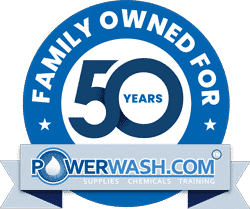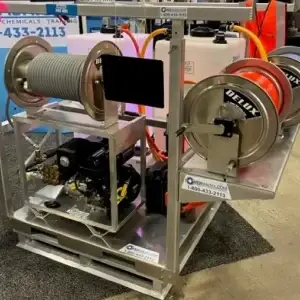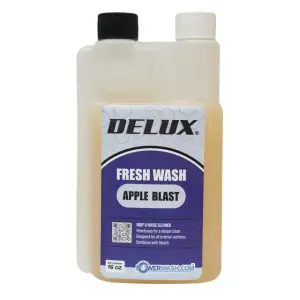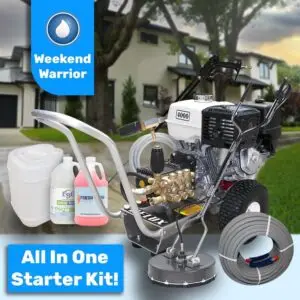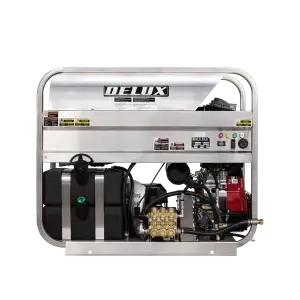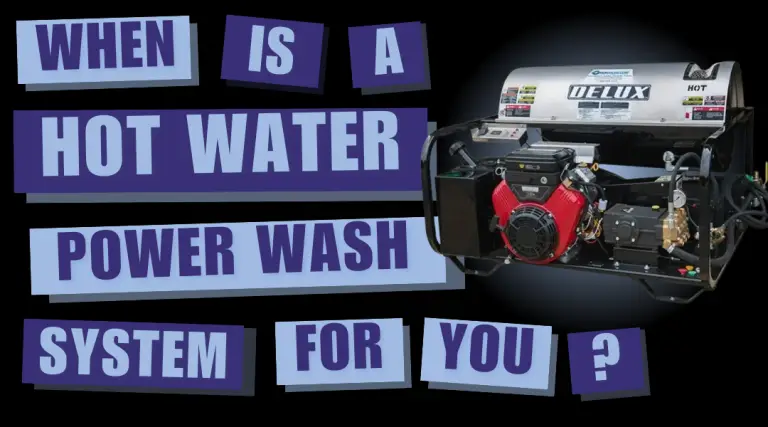- Home
- /
- Power Wash Basics
- /
- What is Cleaning Units – PSI – GPM – Nozzle Size and More
Subscribe To Our Newsletter
Stay in the know on the latest products, deals, events, tips & tricks.
Social Media
Popular Products
-
All Pressure Washers
Delux Mustang Pro Mini Complete Skid 4′ – Approved for Drone Use (Surface BOT)
$13,187.90 -
-
All Pressure Washers
Weekend Warrior- Residential Cleaning House Washing Business Starting Pack
$2,971.47 -
What is Cleaning Units – PSI – GPM – Nozzle Size and More
Understanding Cleaning UnitsCleaning Units: What it MeansSummary: The Power Washing industry expresses cleaning power as either “Cleaning Units”, measured by the equation PSI x GPM, or as “Cleaning Units/hr”: PSI x GPM x hrs. You will find these numbers in the product literature of a pressure washer and it will give you a good idea of the effective cleaning power of a pressure washer.While this information can provide a starting point, three important items are left out: heat, nozzle type, and chemicals. Depending on how they combine, they can multiply cleaning effectiveness several times over. Because there is not a standard that considers all five factors, only the professionals at an experienced power wash dealer, like PowerWash.com, can show you the full range of the cleaning capability of a system. This article contains brief explanations of the following topics.Water Pressure – PSIGallons per Minute – GPM HeatWands and NozzlesNozzle spray-angle applicationsWater: the Universal SolventChemicalsWater Pressure – PSIWater pressure from the pressure washer is measured in pounds per square inch or PSI. This pressure is the amount of force delivered to the surface being cleaned, and is the critical factor in breaking debris from the surface being cleaned. PSI is determined by orifice size of the nozzle tip and the flow rate (gallons per minute). For labeling purposes, the standard nozzle size for measurement is a #4 orifice. This size delivers 0.4/gpm at 40psi and 4.0/gpm at 4,000psi. As nozzle sizes increase or decrease, PSI fluctuates accordingly. A nozzle chart is necessary in order to determine PSI with different flow rates and nozzles sizes. Nozzle selection depends on the work being done and the amount of pressure the surface can withstand before it is damaged.While PSI is a constant at the tip of the nozzle, the pressure decreases as the distance from the targeted surface increases. Experienced power wash contractors understand how to manipulate these distances for maximum cleaning power and use of time.3,000 to 3,500 PSI power wash systems are the standard equipment in the contract power washing industry. A big reason for this is that while there is not much of a price difference between 2,000 PSI and 3,000 PSI washers, there is a tremendous difference in cleaning power.Gallons per Minute – GPMGallons per Minute (GPM or g/m) refers to the rate at which water flows from a pressure washer to the surface being cleaned (known as flow rate). Higher GPM improves cleaning ability. Most commercial contractors use a flow rate of 4gpm or greater, because rates below this do not provide a sufficient flow to be able to clean efficiently. Commercial pressure washers typically deliver 4 to 6gpm. While flow rates less than may do a good job, it is ultimately more expensive as it takes longer, which in turn increases labor costs.HeatHeat increases the cleaning abilities of water, detergent, chemicals, and solvents. In cleaning applications where grease, oil, and gum are involved heat, manifesting itself as hot water, breaks down these substances quickly, allowing the other products to work at peak efficiency.Wands and NozzlesWands attach to the pressure hose with a gun, the trigger of which starts and stops the flow of water. There are variable pressure wands, dual-lance wands, standard wands, or straight-through wands available. The one to select depends on the job. Refer to our catalog for complete descriptions of all of our wands. When you call PowerWash.com, we will help you select the right product for your business. Your satisfaction is what matters most.The working end of the wand is fitted with different sized tips or nozzles that provide different spray patterns. Spray patterns range from zero to 65 degrees. All power washing nozzles have a four or five-digit code stamped on them identifying the spray angle and orifice size. The first two digits refer to the spray (dispersal) angle in degrees: 15 is 15 degrees, 25 is 25 degrees, and so on. The remaining digits refer to the orifice size, and are standardized in the industry. A three-digit number indicates half sizes.Nozzle spray-angle applications Zero-degree nozzle – (code stamp 00) provides a concentrated stream for blasting or gouging away stains. It is excellent for: Cleaning overhead areas and kitchen vents Removing dried and caked material from equipment and vehicles Removing heavy stains and buildup from concrete Removing rust and other types of oxidationCaution: Using this nozzle improperly will cause injury and serious damage. It can put a hole in your foot unless the proper footwear is worn. Also, a zero- degree nozzle will leave chicken tracks (tracers) on the surface being cleaned. Prevent this phenomenon by using a zero- degree turbo) rotating nozzle. A turbo nozzle when moved at the proper rate will leave a clean surface without chicken tracks. If the turbo nozzle is moved too fast, it leaves swirls that look like a stretched out Slinky. Turbo nozzles are available in fixed- degree as well as variable degree nozzles in fixed sizes.15-degree nozzle – This provides a little wider spray and acts like a scraper. It is well-suited for: Heavy duty scraping of water vehicles and equipment Heavy mildew stain removal Removing rust and other types of oxidation Scraping grease and dirt from different surfaces and paint wood, masonry, and metal25-degree nozzle – This is an excellent tool for sweeping away dirt and debris. Among its applications are: General cleaning Light mildew stain removal Preparation surfaces for painting Removing bacterial and algae build-up in pools Roof, gutter, and downspout cleaning40-degree nozzle – This nozzle washes large surface areas quickly. Its best uses are for Light cleaning, washing, and rinsing Washing and rinsing cars, pickups, boats, and other watercraft Cleaning flat surfaces such as roofs, windows, patios, and driveways65-degree nozzle – This nozzle is a wide spray pattern used mostly in spray bars (a long pipe with several nozzles in it to cover a wide area), to cover a wide area without much power. Its best uses are for: Spray Bars Lightly washing a wide area Chemical Application Water BroomsPlease contact our professional customer service department. We can help you find the right wands and nozzles for your power washing needs. In addition, our catalog provides detailed descriptions of all of our wands and nozzles, as well as describing their most efficient applications.Knowing what equipment to use for different applications is the first step. A qualified vendor like PowerWash.com, will listen to your needs and show you what options best meet those needs. We will also provide training and on-going customer support.Water: the Universal SolventA few words need to be said about water. Water is the “Universal Solvent”, so called because it dissolves more substances than any other liquid, including acids and bases. Pressure washing enhances the cleaning ability of water by adding: Solvents and Chemicals Heat Abrasion (a combination of pressure, spray angle, rotating nozzles and brushing) Dwell time (the length of time a detergent or solvent sits on the area(s) being cleaned)The proper combination these enhancers with water, and their correct application, will successfully clean almost anything.ChemicalsThe chemicals, solvents, and detergents used all depend on the surface being cleaned and the dirt being removed. Their proper application increases productivity and decreases labor costs. Using them indiscriminately is a danger to the contractor, the crew, and the environment. Careful reading and following of directions is crucial.When cleaning chemicals are properly combined with flow rate, pressure, nozzle configuration, and heat, cleaning is fast and highly efficient. Manipulating any of these five has an impact on cleaning – either positively or negatively – depending on what was adjusted. Misapplication creates dangerous and toxic situations. When you work with PowerWash.com, you will receive expert guidance and training in the proper use, containment, and disposal of chemicals.
Share This Post
More To Explore
Tax Benefits For Power Washing Professionals
Navigating the complexities of tax planning can be a daunting task for power washing professionals, yet it’s a crucial aspect …
Top 5 Must-Have Attachments to Elevate Your Power Washing Efficiency and Precision
Attachments for power washing systems are essential tools that significantly enhance the effectiveness, speed, and precision of professional cleaning jobs. …
When Should You Get A Hot Water Power Wash Machine?
When a Hot Water Power Washing System is Your Best Choice When deciding between a hot water power washing machine …
The Science Behing Power Washing
The Science Behind Effective Power Washing The science behind power washing is a balance of pressure, water, and chemical solutions …
